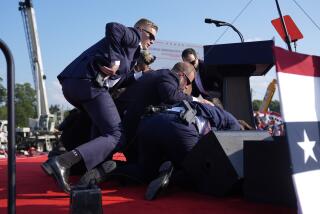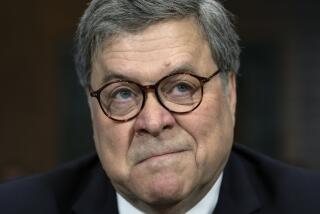White House Memo Fuels Debate on Whether Parks, Politics Mix
- Share via
WASHINGTON — Politicians wanting to make appearances in national parks and other federally owned and operated places could begin finding their access limited.
An advisory from the White House Office of Special Counsel issued this month to federal employees warned that “the Hatch Act should be considered carefully when handling a candidate’s request to visit or use a federal building. We strongly encourage all federal agencies receiving such requests to contact OSC prior to granting such a request.”
For the record:
12:00 a.m. Sept. 8, 2004 For The Record
Los Angeles Times Wednesday September 08, 2004 Home Edition Main News Part A Page 2 National Desk 1 inches; 51 words Type of Material: Correction
Special counsel -- An Aug. 30 article in Section A about the use of federally owned properties for campaign purposes referred to the White House Office of Special Counsel. The U.S. Office of Special Counsel that enforces the Hatch Act is an independent agency and not part of the White House.
The special counsel’s memo has sparked protest from some who say it outlines a broad new interpretation of the Hatch Act, which restricts the political activities of government employees. Others wondered where to draw the line between hosting an elected official and engaging in partisan politics.
The White House said it was a coincidence, but the Aug. 9 advisory was distributed on the day that Sen. John F. Kerry, the Democratic presidential nominee, was denouncing President Bush’s environmental policies using Grand Canyon National Park as a backdrop.
“There is going to be an awful lot of gray area,” said Jack Davis, who served as an associate director of the National Park Service under the administration of Bush’s father. He said advisories reminding employees of the Hatch Act restrictions during election years were typical.
But instead of clarifying the issues, the Aug. 9 directive added to the confusion, said Jeff Ruch, director of Public Employees for Environmental Responsibility, the nonprofit group that publicized the advisory.
Although the advisory specifically prohibits partisan activity in federal buildings and offices, it also refers to restrictions on “federal facilities.”
“Is an overlook a federal facility? Is a parking lot?” asked Bill Wade, director of the Coalition of Concerned National Park Service Retirees, an advocacy group critical of the administration’s funding for national parks. “I think that’s a very fine line.”
The debate goes beyond semantics, said Ruch. By putting “town hall meetings, rallies, parades, speeches, fundraisers, press conferences, ‘photo ops’ or meet-and-greets” on the list of campaign activities banned in federal buildings, the Office of Special Counsel barred a number of activities that border on “official business” and put the onus on federal workers to figure out which was which, he said.
“Federal agencies should ensure that candidates who visit their facilities to conduct official business do not engage in any political campaign or election activity during the visit,” the advisory reads.
Scott J. Bloch, White House special counsel, said, “It’s not the intention of our office to try to trap anybody.” Bloch said the advisory was meant to warn employees that “some activities that sound nonpartisan may turn out to be partisan.” He said each case was investigated individually.
One case being investigated is Kerry’s visit to NASA in late July. Kerry, along with a handful of other senators, held a “town hall” meeting at an auditorium at the Kennedy Space Center, a NASA facility in Cape Canaveral, Fla. The group later toured the space center.
Photos that NASA employees took of the candidate in a protective blue suit were posted on a NASA website, then removed while lawyers determined whether posting the pictures constituted a campaign activity in violation of the Hatch Act. Some photos were reposted.
Neither Bloch nor a NASA spokesman would comment on the investigation.
Bush also has used dramatic federal locales to promote his administration. In August 2002, he visited South Dakota -- then the site of a bitter Senate race -- to promote his plans for the Homeland Security Department against the backdrop of Mt. Rushmore.
On Wednesday, the American Federation of Government Employees asked the special counsel to start another Hatch Act investigation. The union, which represents 600,000 federal workers, said it received a deluge of complaints after a public affairs officer at Kirtland Air Force Base in Albuquerque sent an e-mail inviting employees to attend a Bush campaign speech.
More to Read
Get the L.A. Times Politics newsletter
Deeply reported insights into legislation, politics and policy from Sacramento, Washington and beyond. In your inbox three times per week.
You may occasionally receive promotional content from the Los Angeles Times.











